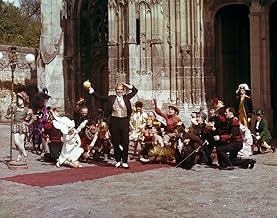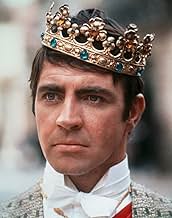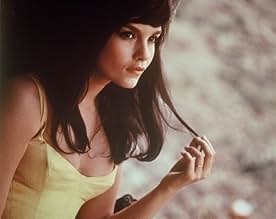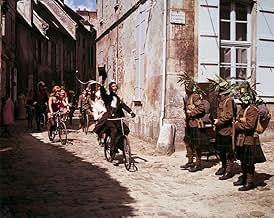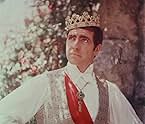IMDb RATING
7.3/10
4.7K
YOUR RATING
During World War I, a British private, sent ahead to a French town to scout for enemy presence, is mistaken for a King by the colorful patients of an insane asylum.During World War I, a British private, sent ahead to a French town to scout for enemy presence, is mistaken for a King by the colorful patients of an insane asylum.During World War I, a British private, sent ahead to a French town to scout for enemy presence, is mistaken for a King by the colorful patients of an insane asylum.
- Director
- Writers
- Stars
Pier Paolo Capponi
- Un Officier Anglais
- (as Paolo Capponi)
Georges Adet
- L'aliéné-docteur
- (uncredited)
Jackie Blanchot
- Le Gabalou
- (uncredited)
Robert Blome
- Un aliéné
- (uncredited)
Jean-Marie Bon
- Un aliéné
- (uncredited)
- Director
- Writers
- All cast & crew
- Production, box office & more at IMDbPro
7.34.6K
1
2
3
4
5
6
7
8
9
10
Featured reviews
A lifetime favourite
I saw King of Hearts on its original release when I was 15. For 35 years it has remained one of my favourite movies; perhaps the number one. Nothing in particular about the film so qualifies it. I like quite a number of "better" films, but KOH touched me in a way that stuck. It is an authentic movie; the reality is as simple as the english speaking english, the french french, and the germans german. The crazy people are sane, the sane people crazy. It is funny and tragic and perhaps a little too quirky but ... if you haven't tried it on you should.
10RDenial
They don't make them like this anymore
As I was reading through the comments here for "King of Hearts" I noticed two different schools of thought on the film. Many, like myself, have fond memories of seeing this film in the 60s and 70s and were delighted by it. The other comments come from younger viewers who see this film as being "dated" and not that funny, yet worthwhile viewing. At first I was a little miffed at this generations comments about a gem of my generation, until it dawned on me that they were somewhat correct. The film is a bit dated because they just do not make films like this anymore. It was never meant to be knee slapping funny. The humor was a non-intrusive "gentle" humor that seems to be a foreign concept in this day and age. Another reason many younger viewers do not "get" this film is because one of the themes here is non-conformity. This was a crucial concern of those growing up in the 60s. We wanted our individuality to show and not be just a number. Society has did a 180 since then. Today people are more concerned with fitting in than standing out. So yes, this film possibly is a bit dated. It is a bit of movie magic from a far simpler time and I have a feeling that there are a lot of people under 30 who would not see this as dated at all. King of Hearts is one of a small handful of films that celebrates the simple magic of being alive. Come and experience it.
charming
A charming film, first, for the contained naked truth. Second, for status of reflection in mirror of near reality, in too many senses. Not the last, for acting and the veil of innocence and cold / precise perspective about life, freedom, expectations, fears , joy in pure state. A film deserving to be loved and seen often. As a sort of cure. So, Alan Baits and Genevieve Bujold. And the others. A cold perspective, seeming a kind of verdict, about reality and its large illusions.
Cult film which needs to be seen more
De Broca's delightful and surreal anti-war fantasy quickly attained a cult status when it was first released, but in recent years it has dropped more and more out of sight. A shame, because it is a charming film, the whimsical, romantic nature of which is entirely French. Even though the underlying message, that of preferring one kind of insanity to another is a simple, absurdist one, the viewer is still carried along by the Gaullic charm of it all.
As the much-put-upon martial ornithologist, It's not just because Bates is the only English member of the cast that one is aware of some awkwardness in his casting. For English cinema goers in particular, familiar with his career, his usual jocular masculinity is hard to reconcile with an child-like character, swept along by events. Those who remember Bates and Oliver Reed wrestling nude in 'Women in Love' (1962) from the same period, or his cocky Vic in 'A Kind of Loving' (1962), may bulk at Bates portraying such a confused innocent. Having said that, Bates' actual performance is balanced and restrained, all of a piece with the rest of the cast.
'King of Hearts' is primarily an ensemble piece. Many of the film's most delightful moments spring from the fancy-filled and flirtatious lunatics who quickly fill the streets, shops and occupations left by the fleeing villagers, their interaction with each other, and Plumpick. This world of fantasy is curtailed by the village walls, which physically as well as mentally encircle their environment. Outside is reality (no matter how ludicrously it is presented), conflict, death. Inside the walls is harmony of sorts, life celebrated. This distinction between outside and inside is made clear in the film. As soon as Plumpick attempts to ride a horse back into the real world for help, the music and the mass accompaniment of him by the inmates has to end until he is obliged to return.
As the 'King of Hearts' Plumpick is at the center of his motley 'people', as well as of Coquelicot's (Geneviève Bujold) affections. Once he awards himself his name, in a panic and on the run, his 'subjects' call out for him. He is promptly 'crowned' (both by banging his head, inducing his initial confusion, and though acquiring his 'kingship'). He is awarded a bride, and accepted as an unique traveller into the society of the amiably mad. Their acceptance of him anticipates the final scene of the film, when a chastened Plumpick re-admits himself into their company, having rejected the larger insanity of warfare.
It's fitting in a way that the least successful parts of the film lay outside of the village, where comic stereotypes replace whimsy and the comedy is drawn with much broader strokes. In particular Colonel MacBibenbrook (Adolfo Celi, better known as Emil Largo in 'Thunderball') is uncomfortably close to parody, and his part would have been much better cast with an actor like Trevor Howard who could excel with a line in ironic bombast. The Germans fare no better and, although amusing and lightweight in their capers, one misses the delicacy with which the lunatics are portrayed. One suspects that De Broca associates more with the geniality of the insane, as we all do given the options, and this sympathy is reflected on screen
Tellingly, the lunatics are not completely oblivious to the hostile world which surrounds them, although they are content to ignore the immediate threat of destruction and Plumpick's warnings. At the end of the film, once the opposing forces have symbolically destroyed themselves, Marcel says:'I'm tired of this game, let's go back to our rooms'. With deliberate sadness, they divest themselves of their play robes and return to their asylum, a divestment scene at the same time quiet, serious and eminently sane. It is clear that they are mad - but not crazy.
As the much-put-upon martial ornithologist, It's not just because Bates is the only English member of the cast that one is aware of some awkwardness in his casting. For English cinema goers in particular, familiar with his career, his usual jocular masculinity is hard to reconcile with an child-like character, swept along by events. Those who remember Bates and Oliver Reed wrestling nude in 'Women in Love' (1962) from the same period, or his cocky Vic in 'A Kind of Loving' (1962), may bulk at Bates portraying such a confused innocent. Having said that, Bates' actual performance is balanced and restrained, all of a piece with the rest of the cast.
'King of Hearts' is primarily an ensemble piece. Many of the film's most delightful moments spring from the fancy-filled and flirtatious lunatics who quickly fill the streets, shops and occupations left by the fleeing villagers, their interaction with each other, and Plumpick. This world of fantasy is curtailed by the village walls, which physically as well as mentally encircle their environment. Outside is reality (no matter how ludicrously it is presented), conflict, death. Inside the walls is harmony of sorts, life celebrated. This distinction between outside and inside is made clear in the film. As soon as Plumpick attempts to ride a horse back into the real world for help, the music and the mass accompaniment of him by the inmates has to end until he is obliged to return.
As the 'King of Hearts' Plumpick is at the center of his motley 'people', as well as of Coquelicot's (Geneviève Bujold) affections. Once he awards himself his name, in a panic and on the run, his 'subjects' call out for him. He is promptly 'crowned' (both by banging his head, inducing his initial confusion, and though acquiring his 'kingship'). He is awarded a bride, and accepted as an unique traveller into the society of the amiably mad. Their acceptance of him anticipates the final scene of the film, when a chastened Plumpick re-admits himself into their company, having rejected the larger insanity of warfare.
It's fitting in a way that the least successful parts of the film lay outside of the village, where comic stereotypes replace whimsy and the comedy is drawn with much broader strokes. In particular Colonel MacBibenbrook (Adolfo Celi, better known as Emil Largo in 'Thunderball') is uncomfortably close to parody, and his part would have been much better cast with an actor like Trevor Howard who could excel with a line in ironic bombast. The Germans fare no better and, although amusing and lightweight in their capers, one misses the delicacy with which the lunatics are portrayed. One suspects that De Broca associates more with the geniality of the insane, as we all do given the options, and this sympathy is reflected on screen
Tellingly, the lunatics are not completely oblivious to the hostile world which surrounds them, although they are content to ignore the immediate threat of destruction and Plumpick's warnings. At the end of the film, once the opposing forces have symbolically destroyed themselves, Marcel says:'I'm tired of this game, let's go back to our rooms'. With deliberate sadness, they divest themselves of their play robes and return to their asylum, a divestment scene at the same time quiet, serious and eminently sane. It is clear that they are mad - but not crazy.
Great, Charming, Profound
The King of Hearts should be seen by a new generation of viewers now in the
summer of 2004. This is a great fable--which during the 1980s might have
seemed dated, but now is more relevant than ever. It is a great meditation on war. As a movie, the circus-like atmosphere and characters combine to form a grand entertainment. We get seduced by the world of childlike imagination and sense of wonder we see in the inmates. We embrace them. Great
philosophical moments abound--all surrounded by beautiful colors, wonderfully funny moments and a gorgeous music score. The final scene is such a classic-- and takes the audience by such surprise--one goes out of the film absolutely
exhilarated. A funny, charming and ultimately profound film.
summer of 2004. This is a great fable--which during the 1980s might have
seemed dated, but now is more relevant than ever. It is a great meditation on war. As a movie, the circus-like atmosphere and characters combine to form a grand entertainment. We get seduced by the world of childlike imagination and sense of wonder we see in the inmates. We embrace them. Great
philosophical moments abound--all surrounded by beautiful colors, wonderfully funny moments and a gorgeous music score. The final scene is such a classic-- and takes the audience by such surprise--one goes out of the film absolutely
exhilarated. A funny, charming and ultimately profound film.
Did you know
- TriviaWhile the film was a flop with critics and audiences in France, it was an unexpected cult success in the USA, running for years in Boston repertory film houses circa 73-76. Midnight showings around the country made it an early cult film, like The Rocky Horror Picture Show (1975), Eraserhead (1977), El Topo (1970), Beyond the Valley of the Dolls (1970), etc...
- GoofsThe stairs/ladder Plumpick uses to climb to the top of the blockhouse appear out of nowhere.
- Quotes
[last lines]
Le Duc de Trèfle: The most beautiful journeys are taken through the window.
- Crazy creditsThe credits rise and then fall to coincide with the sound of a large clock.
- ConnectionsReferenced in Saving Private Ryan (1998)
- SoundtracksLa Valse Tordue
Written and Performed by Georges Delerue Et Son Orchestre
- How long is King of Hearts?Powered by Alexa
Details
- Release date
- Countries of origin
- Languages
- Also known as
- Herzkönig
- Filming locations
- Senlis, Oise, France(insane asylum and town square scenes, Senlis is 55 km north of Paris)
- Production companies
- See more company credits at IMDbPro
Box office
- Gross US & Canada
- $17,646
- Opening weekend US & Canada
- $3,443
- Feb 25, 2018
- Gross worldwide
- $18,130
Contribute to this page
Suggest an edit or add missing content


![Trailer [OV]](https://m.media-amazon.com/images/M/MV5BOTgyNWQ0NTctZWY1Mi00NzY1LTljNWItMWFlNjI2MDMzM2NmXkEyXkFqcGdeQXRyYW5zY29kZS13b3JrZmxvdw@@._V1_QL75_UY281_CR79)

